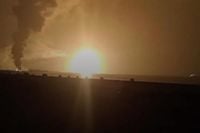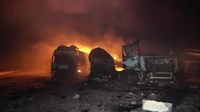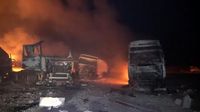In a devastating escalation of military action in Yemen, at least 74 people have been reported dead and 171 injured following a U.S. airstrike on the Ras Issa oil port on April 18, 2025. This facility, located on the Red Sea, is controlled by Houthi rebels, who have been engaged in a prolonged conflict against the internationally recognized Yemeni government.
The U.S. military confirmed the destruction of the Ras Issa terminal, stating that the operation aimed to cut off a crucial source of fuel supplies and financial resources for the Houthis, who have been accused of using these facilities to fund their military operations. According to the U.S. Central Command (Centcom), "the objective of these attacks was to weaken the source of economic power of the Houthis, who have terrorized the region for over a decade." This airstrike marks one of the deadliest assaults by the U.S. since it began its military campaign against the Houthis on March 15, 2025.
Initial reports from Al-Masirah TV, a channel linked to the Houthis, indicated that 38 workers had died and 102 were injured. However, the Houthi Ministry of Health later revised the figures, raising the death toll to 74 and injuries to 171, which includes five rescuers and ambulance workers who were attending to the victims at the time of the attack.
Images broadcast by Al-Masirah showed a large fire engulfing the port area, with thick smoke billowing over numerous ships docked nearby. Eyewitness accounts described the scene as chaotic, with one witness stating, "The entire area was set on fire. When we managed to escape, we saw that the place where we were hiding was also being attacked." The Houthi leadership has condemned the U.S. actions as a "flagrant violation of the sovereignty and independence of Yemen" and labeled the strike a "war crime."
The U.S. has justified its military actions by asserting that the Houthis are utilizing the Ras Issa port not only for legitimate imports but also for illicit oil exports, which fund their military campaigns. The U.S. and other nations have criticized the Houthis for monopolizing revenue from this port, which, along with the ports of Al Hudeida and Salif, accounts for approximately 70% of Yemen's imports and 80% of humanitarian aid, according to United Nations estimates.
In response to the airstrikes, the Houthis have vowed to continue their offensive against both U.S. and Israeli interests in the region. They have also called for demonstrations in various cities to protest the bombings and express solidarity with Palestinians in Gaza. The past weeks have seen a significant uptick in missile attacks by the Houthis, including a recent missile that was intercepted by the Israeli defense forces, which fell near Bethlehem.
Iran, a key ally of the Houthis, condemned the U.S. strikes as "barbaric" and a violation of international law. The Iranian government has expressed its support for the Houthis, asserting that the U.S. attacks are an affront to Yemeni sovereignty. The internationally recognized Yemeni government, however, has placed the blame on the Houthis for transforming the Ras Issa port into a hub for smuggling Iranian weapons and fuel, thus undermining the humanitarian needs of the Yemeni people.
As tensions escalate, the U.S. has conducted over 200 airstrikes against Houthi positions in the past week alone, aiming to dismantle their military capabilities and prevent further attacks on commercial vessels in the Red Sea. The ongoing conflict has severely disrupted maritime traffic, with many shipping companies forced to reroute around the southern tip of Africa, significantly increasing transit times and costs.
In a broader geopolitical context, these military actions coincide with upcoming talks between U.S. and Iranian representatives in Rome, scheduled for April 19, 2025, where discussions will focus on Iran's nuclear program. Analysts suggest that the U.S. military operations in Yemen send a clear message to Tehran, indicating Washington's commitment to countering Iranian influence in the region.
President Donald Trump has reiterated that the U.S. will continue its military offensive against the Houthis until they cease to pose a threat to maritime navigation and regional stability. The current situation reflects a complex interplay of local conflicts, international diplomacy, and the broader implications of U.S. foreign policy in the Middle East.
The Houthis' response to the U.S. strikes and the ongoing military operations will likely shape the future of the conflict in Yemen and its impact on regional stability. As the humanitarian situation in Yemen continues to deteriorate, the international community watches closely, hoping for a resolution that can bring peace to a nation long ravaged by war.









